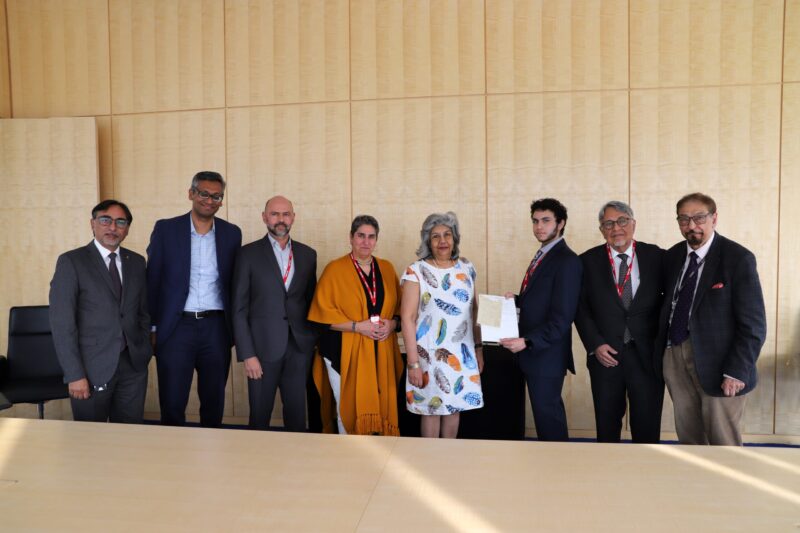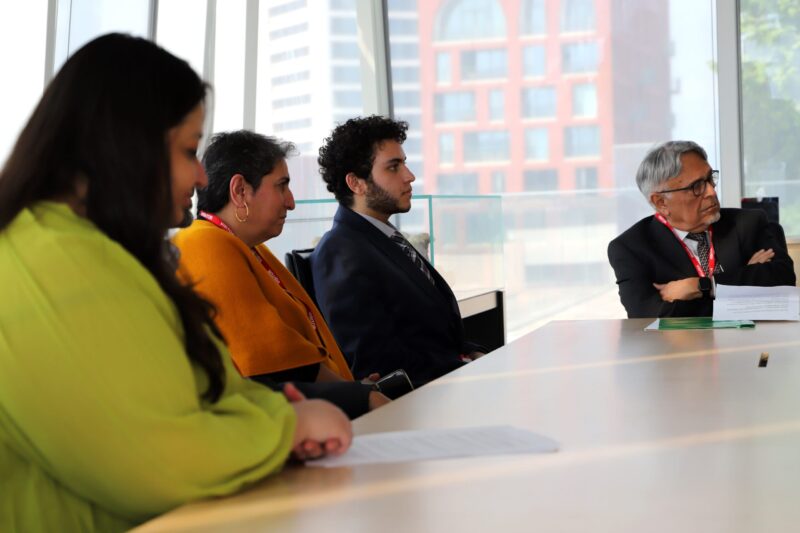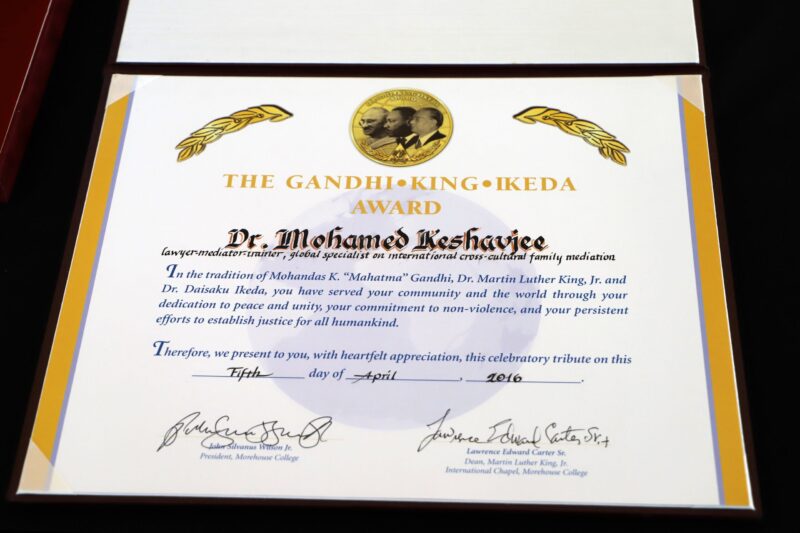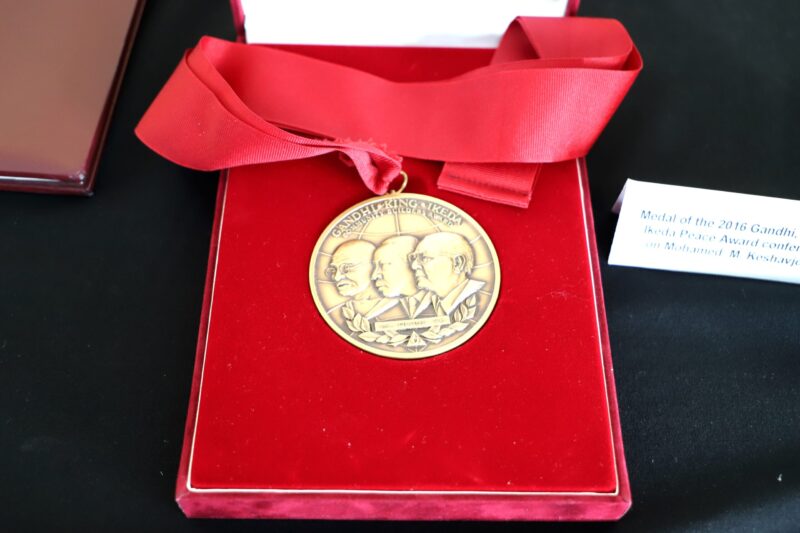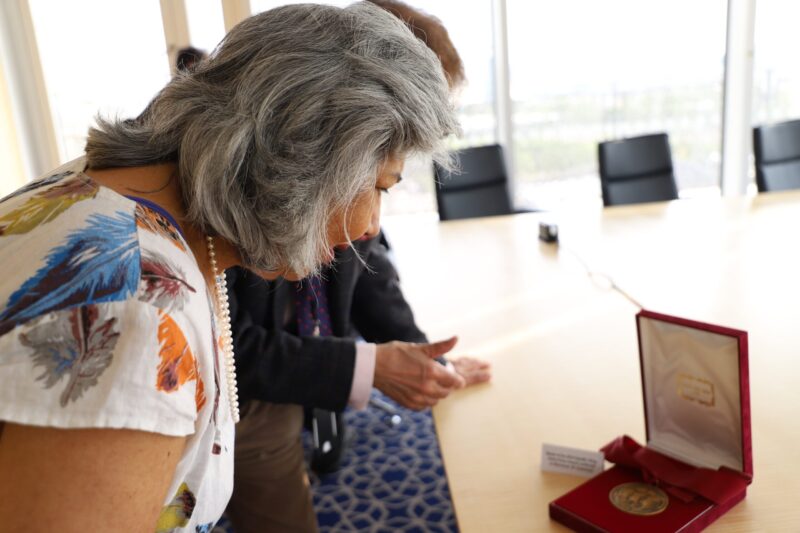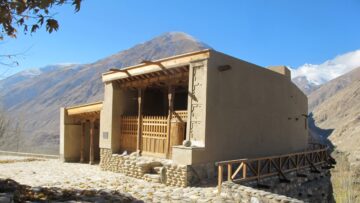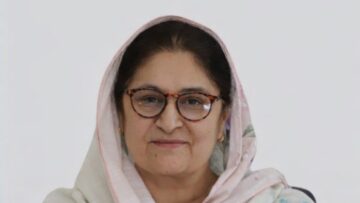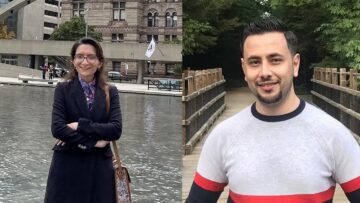An original letter dated 1938 to Velshi Keshavjee, a South African Ismaili pioneer, written by Mahatma Gandhi from his prison cell in Wardha, India, was donated to The Institute of Ismaili Studies, London, on 2 May 2025 – together with the Gandhi, King, Ikeda Peace Award medal awarded to Dr Mohamed Keshavjee – by two scions of the Keshavjee family, Yusuf Keshavjee and Dr Mohamed Keshavjee, respectively, for safekeeping in perpetuity.
Yusuf Keshavjee, a retired member of the AKU Board of Trustees, emphasised that the letter which had remained with his family for some 87 years, was entrusted to him for safe keeping in 1991 by his father Alijah Habib V. Keshavjee, a social reformer who led his life in accordance with the principles enunciated by Mahatma Gandhi. Habib Keshavjee recalled that as a child both Mahatma Gandhi and CF Andrews, Gandhi’s close friend and student, visited their home in Marabastad in 1914. Gandhi was a friend of Habib’s father, Velshi Keshavjee, and a teacher to his son Rajabaly at the Tolstoy Farm near Johannesburg in 1912.
Following Gandhian principles, Habib Keshavjee, as early as the 1940s, worked for the betterment of the African communities in the Witwatersrand area, helping budding African business owners to source products directly from manufacturers in the country – thereby giving African retailers an equitable margin of profit. He also worked closely with the Anglican Bishop Father Trevor Huddleston, an anti-apartheid social activist who started the Africa Feeding Scheme in 1945 to provide soup kitchens for hungry African schoolchildren in areas such as Alexandra Township and Soweto. Habib helped budding African talent to thrive through his cinema where Miriam Makeba, a black South African female singer, performed during the interval on Friday evenings to provide for her family. In 1951, Habib arrived in Kenya and here he saw how disadvantaged the Africans were and, following Jomo Kenyatta’s incarceration in 1952, assisted Kenyatta’s family to the chagrin of the colonial government.
In 1945 Habib Keshavjee established the Aga Khan Nursery school in Pretoria under the guidance of Imam Sir Sultan Muhammad Shah on land donated by the Manjee Keshavjee family. The school went on to produce South Africa’s first non-white female ambassador as well as the present incumbent judge of the Constitutional Court of South Africa, Judge Jody Kolappen, a well-known human rights advocate.
Calling on his grandson Ayden to hand over the letter to Professor Zayn Kassam, Director of The Institute of Ismaili Studies, in the presence of his son Irfan and daughter Tasreen, Yusuf Keshavjee exhorted his grandson:
Know your heritage, carry forward the values of justice, integrity and the tireless pursuit of truth. Your history is not just something to inherit but yours to shape. Walk in the footsteps of those who dared to change the world through upholding the principles of social justice.
Dr Mohamed Keshavjee, recipient of the 2016 Gandhi, King, Ikeda Peace Award gifted his medal for safekeeping in perpetuity to The Institute of Ismaili Studies, which he said for historical purposes is where it should belong. ‘It was for pioneering work in mediation under the direct guidance of the 49th Imam Shah Karim who painstakingly steered its direction.’ He mentioned that medals, citations, and awards say a great deal about our social history. Ismailis in Africa and elsewhere have contributed significantly to social development and political consciousness. We need to capture their histories.
Citing just a few examples of this in Africa, he mentioned the work of RK Khan and MC Chagla in South Africa, Hussain Sulaiman Verjee in Kenya, and more recently, Amir Jamal in Tanzania and Ibrahim Nathoo in Kenya. Examples can also be found in other parts of the world such as the contribution of Saifullo Abdullaev (d. 1938) in Tajikistan, reputed to be one of the founders of Soviet Tajikistan, and Shirinsho Shotemur, a member of the Bolshevik party. ‘There is a great deal of history that still needs to be captured,’ he said. ‘These artefacts have to be given a voice.’
Professor Zayn Kassam lauded these outstanding gifts which underscored the confidence pioneering families are today showing in The Institute of Ismaili Studies as a repository for their family materials. All the Keshavjee family materials including historic documents of the South African Jamat are now donated to the Institute including copies of The Aga Khan and Africa: His Leadership and Inspiration (Mercantile Printing Works, 1947) compiled by Habib V Keshavjee and Into That Heaven of Freedom (Mawenzi House Publishers, 2016) by Mohamed Keshavjee. In addition, valuable archival documents previously part of Mr Ameer Manjee Keshavjee and Dr Rashida Keshavjee’s collections, especially focusing on the educational development of Ismaili Jamats in various contexts, have also been donated to The Institute of Ismaili Studies’ Ismaili Special Collections Unit.


